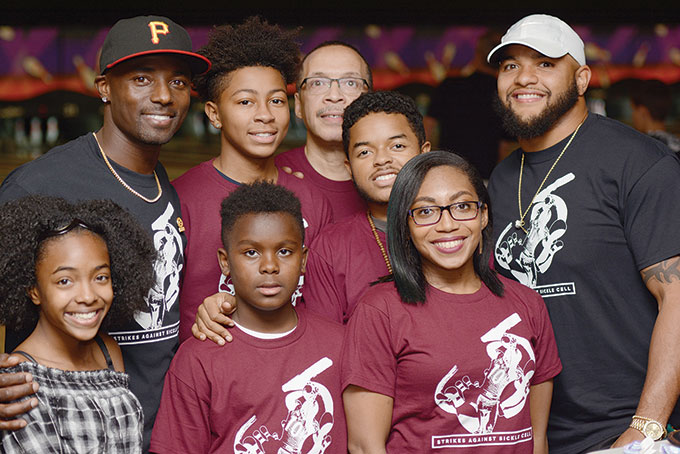
The kids shared bowling lanes and fun with Holmes, former Steelers Charlie Batch and Brett Keisel, and current Steelers Roosevelt Nix and Joshua Dobbs. “Keep encouraging them, spend more time with them, get to know the kids as a whole, because these kids, they kind of go into a shell of being different from everybody,” Holmes told the Courier in an exclusive interview. Holmes’ son, Santonio “TJ” Holmes III, has Sickle Cell disease. He is now 15 years old.
“It’s not a good feeling to know that your own child doesn’t communicate with you on the real issues that are bothering him which are allowing him or her to be less active, or even slacking in their schoolwork. And it’s because of Sickle Cell,” Holmes said. “So just talk to them more and spend more time with them, and do fun things that the kids like to do, and I think that in a whole will bring the spirit out of the kid so that they can enlighten themselves with the fact that parents are here no matter what.”
Jessica Owens, mother of Chase and Faith Owens, told the Courier it’s difficult to watch her kids who, in effect, just want to be kids. “The main challenge is the balance of normalcy. These kids are chronically ill, they have limitations and restrictions,” she said, not to mention the hospitalizations.
Jessica Owens, of Monroeville, has been affiliated with the Children’s Sickle Cell Foundation since 2008 when Chase, now 8, was 6 months old. Faith also has the disease. “The foundation has been wonderful, they reached out to me right away,” she said. Owens also mentioned that the foundation has even helped her financially at times.
“Having Sickle Cell, there’s often pain that you go through that others don’t realize,” added Charmaine Clarke. “There are special precautions that we take when it comes to the weather, and making sure that we’re hydrated that people don’t notice that can affect our physical well-being.”
Clarke said she doesn’t have it as bad as others when it comes to the ill-effects of Sickle Cell. But the Pittsburgh CAPA High School graduate said one day during her freshman year of college at Hampton University, she agonized in pain for days.
“I had a pain crisis in my leg, and wasn’t able to walk,” she told the Courier. “I was basically on bedrest. I stayed in bed and took meds.”
Clarke added: “I wouldn’t wish a pain crisis on my worst enemy.”
According to data disseminated by The New York Times, Sickle Cell disease is the most common genetic order in the U.S., with roughly 100,000 Americans currently living with the disease. Another 1,000 are born with the disease each year. To acquire the disease, both parents of a child must possess the Sickle Cell trait, of which there is a 25 percent chance the child will have Sickle Cell disease.
Sickle Cell disease is not a death sentence, The Times report added. Many people with the disease are living into their 40s and 50s, when just 20 years ago, children with the disease rarely lived to become adults, according to the report.
Pittsburgh’s Children’s Sickle Cell Foundation was started by Matthews’ wife, Andrea. Seventeen years ago, her son, John, was diagnosed with Sickle Cell. Citing a number of adult-oriented programs for those living with the disease, Andrea Matthews started an organization two years later, in 2002, that was primarily centered on local children with Sickle Cell.
“One of our slogans that Andrea came up with is, ‘Living well with Sickle Cell.’ We believe in prayer and know that a cure is going to come one day,” Matthews said. “Our job is to make sure that you are well enough to receive that cure when it comes.”
Like us at https://www.facebook.com/pages/New-Pittsburgh-Courier/143866755628836?ref=hl
Follow @NewPghCourier on Twitter https://twitter.com/NewPghCourier

